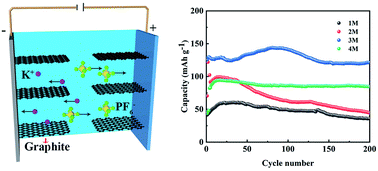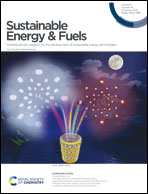Ultrahigh capacity potassium-based dual carbon batteries with a high concentration electrolyte†
Abstract
Currently, low-cost energy equipment with high energy density and power density has become increasingly important in the field of energy storage. Potassium-based dual carbon batteries (K-DCBs) have attracted more attention in large-scale energy storage devices because of their high voltage, low cost, and less pollution. However, the commonly used low concentration electrolytes suffers from a low oxidation potential and limits the energy density of K-DCBs. In this study, the electrochemical properties of K-DCBs based on different concentration electrolytes were investigated. The results show that the K-DCBs assembled based on a 3 M KPF6/EC : DEC : PC electrolyte can attain a superior capacity of 121 mA h g−1 at 1C (100 mA g−1), with a capacity decay of only 2.4% after 200 cycles. The higher concentration of the electrolyte effectively improves the cycling stability and rate capability of K-DCBs.

- This article is part of the themed collection: Sustainable Energy & Fuels Recent HOT Articles


 Please wait while we load your content...
Please wait while we load your content...